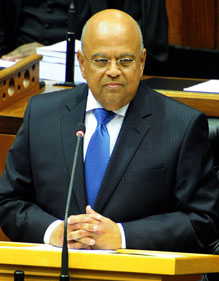
Finance minister Pravin Gordhan’s national budget speech, delivered on Wednesday afternoon, was a display of good news in terms of government efforts to improve the country’s fiscus over the years as well as firm warnings towards those who do business in a dishonest way.
On government spending in particular – an issue whose misuse is reported frequently to Corruption Watch – Gordhan touched on several issues that brought on reactions from MPs gathered in Parliament. An analysis of the validity and cost-effectiveness of government property leases for one, said the minister, has revealed “several deficiencies”.
Some property leased to government is not necessarily occupied, which means that the state pays for a service it does not receive, while in other cases invalid lease agreements with unsubstantiated payments made the work of the Department of Public Works (DPW) difficult. These were only some of the faults uncovered. Gordhan paused after reading these examples to criticise the country’s property industry:
“Why aren’t you honest in your deals with government?” he asked. “Why do we have to spend millions of rands through audit[ing] firms to discover that you are overcharging government for these facilities?”
Property companies, he added, owe South Africa an explanation for “extracting undue money for their services”.
The positive result of the analysis process is that DPW now has a turnaround strategy through which it can now regularise its lease portfolio.
Getting value for money
The office of the Chief Procurement Officer (CPO) – first announced in Gordhan’s 2013 budget speech – also featured substantially in Gordhan’s address. Its objectives, he stressed, are to ensure that government gets value for money in the contracts it enters into and that they meet the correct legal standards set out in the CPO’s policies.
According to Gordhan, CPO Kenneth Brown and his team can claim the following victories for now:
- the development of a standard lease agreement to address defects in government property transactions;
- the standardisation of infrastructure procurement processes and documentation;
- the creation of an inspectorate to monitor procurement plans and audit tender documents;
- an enhanced processing of vendors’ tax clearance certificates to ensure compliance;
- a centralised procurement of health equipment, drugs and medicines to effect savings, and
- an analysis of the business interests of government employees.
“These [CPO officials] are the people who will go to departments, provinces and municipalities to check on the spot whether the documentation is there and that the right process has been followed,” said Gordhan.
On the matter of government employees with a conflict of interest in their private business dealings, he said: “That has to stop!”
Gordhan also mentioned that a million invalid beneficiaries were removed from the social grant system – this may refer to recipients who are deceased or otherwise no longer eligible for a grant, but it may also refer to people who have illegally registered for a grant and are fraudulently receiving money that could benefit a needy person.
Download the People's Guide to the Budget in various languages from the Treasury website.

